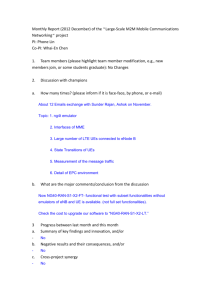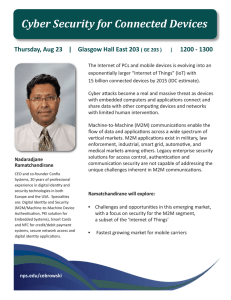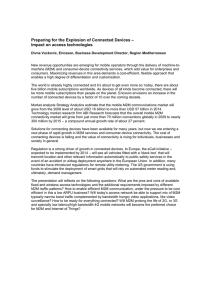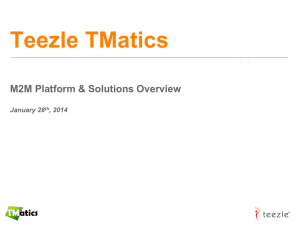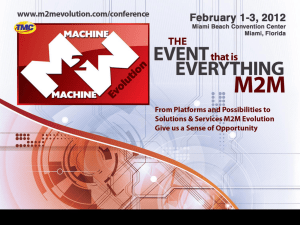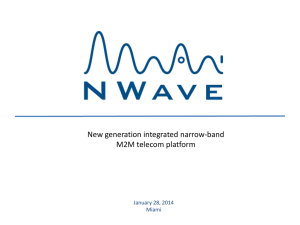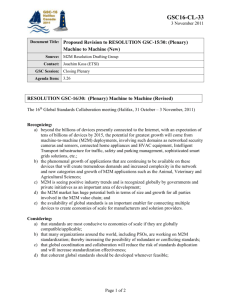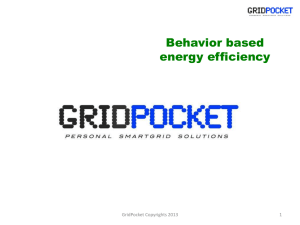DOCUMENT #: GSC15-PLEN-57 FOR: Presentation for Information SOURCE:
advertisement
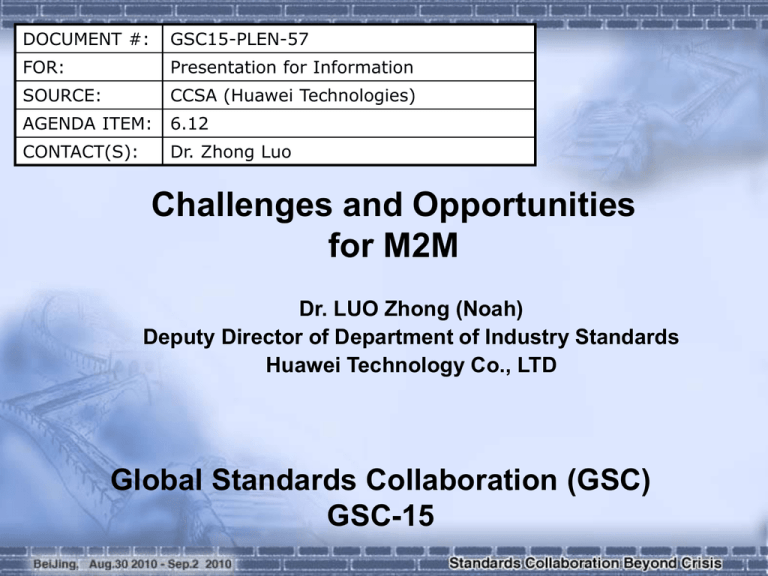
DOCUMENT #: GSC15-PLEN-57 FOR: Presentation for Information SOURCE: CCSA (Huawei Technologies) AGENDA ITEM: 6.12 CONTACT(S): Dr. Zhong Luo Challenges and Opportunities for M2M Dr. LUO Zhong (Noah) Deputy Director of Department of Industry Standards Huawei Technology Co., LTD Global Standards Collaboration (GSC) GSC-15 An Emerging Market Personal iHome Security eHealth 0101010110100 M2M 01010 Smart City Logistics Automobile Metering & Smart Grid • M2M (Machine to Machine) is defined as data communications between entities that do not necessarily involve direct human interaction. Also known as MTC (Machine-Type Communication) within 3GPP, USN (Ubiquitous Sensor Networks) in ITU-T, or as the “Internet of Things”. • Corresponding improvements to network implementations supporting these solutions are required. • Applications utilizing M2M are considered as critical to Smart Grid capabilities and energy efficiency. New Opportunities Identified M2M is returning to the forefront as an application for service providers. • Drivers are both market-based and regulatory M2M holds the promise of bringing benefit to both telecom operators and vendors: • The opportunity may be a “blue ocean” for service providers... because low-bandwidth M2M services can be readily overlaid onto the current user services network. • Vendors are expecting to profit from selling both M2Mcapable devices, and from the network expansion brought about by increased throughput. Some Highlights on M2M Standards SA1 M2M (TR 22.868) SA3 USIM M2M (TR 33.812 ) SA1 NIMTC (TS 22.368), EMTC SA2 NIMTC (TR23.888) ETSI TC M2M ITU-T USN, Vehicle Network, FG Smart Grid ISO/IEC SGSN IEEE 802.15.4-2003 IEEE 802.15.4-2006 IETF 6Lowpan ZigBee V1.0 2001 2002 2003 2004 2005 IEEE 802.15.4-2009 RFC 4919 RFC4944 IETF Roll ZigBee 2006 ZigBee 2007 2006 2007 ZigBee RF4CE 2008 2009 ZigBee IP stack 2010 CCSA TC10 - new Technical Committee set up in early 2010, focusing on Ubiquitous Network standardization. M2M standards in CCSA (1) TC10 is the leading Technical Committee in CCSA focusing on Ubiquitous Network (UN) standardization in China. It’s intended to provide high-quality telecom standards to support the applications of M2M in different industries. This new TC was set up in February 2010. More than 200 delegates from all kinds of companies attended the first TC10 meeting in Beijing, including many potential industry users of the UN specifications. M2M standards in CCSA (2) 4 Working Groups are set under TC10 and more than 20 technical specifications are expected to come out at the end of year 2011: • • • • WG1: Design, Architecture &Common Requirements WG2: Requirements from Industry Applications WG3: Network Improvement to Support the Applications WG4: Extension between Telecom Networks and Sensor Networks Close collaboration between TC10 and existing TCs in CCSA a couple of joint research/standards projects between TC10 and the following TCs: • • • • TC1: WG2 TC3: WG4 TC5: WG3, 4, 7, 8, 9 TC8: WG2 Current Issues Prioritization Issues 2G, 3G or LTE? • Most SDOs take small steady steps towards new specifications, rather than rushing into new standards. • Mobile Operators’ interest in deploying M2M applications immediately on 3G or LTE network is low. • Operators have not yet seen sizeable revenues from M2M , and so are cautious about investment in network capacity and/or capabilities to support it. • Because of the competitive price position of 2G devices, and low aggregate M2M traffic, operators appear willing to deploy M2M initially on existing 2G infrastructures. Operators and Industry • Industries without an embedded communication infrastructure tend to favor a Service Providercentric solution. Service Providers provide them with application platforms, custom or standardized devices, and the data transmission pipe. • Infrastructure industries such as electricity, petrol and railway, already have dedicated communication networks. It is possible for them to build M2M systems independent of the Service Providers’ networks. Challenges to Telecom Industry Business model and value chain • Some carriers already have M2M applications in their networks. However, charging models still tend to be unsophisticated: “per meter per month” or “total Bytes transmitted”… impeding revenue opportunities. • There are questions regarding the role of operators in the value chain. Most service providers do not expect significant revenue in the short-term. • Problems remain in optimization of the network for M2M specific service. Device Price vs. Economies of Scale • There is a ”chicken or egg” dilemma between the ability to drive down device/chipset costs and the need to deploy in vast quantities. Next Steps for M2M Service Providers need to reduce the overall cost brought by introducing M2M business; • Avoid network CAPEX only for the sake of M2M • Drive cost reductions in M2M terminal devices Network resource consumption for M2M terminals is different from existing voice/data devices, so optimization is needed to reduce the overall cost of the operators; • Minimize the impact on the existing conversational/interactive services, currently the main profit source for service providers • Charging models need to be refined, and potentially based on pre-subscribed features/capabilities, rather than connection time (MoU) or data volume (bytes); Competition with non-Telecom service and application providers will increase, so quick movement into the market is essential.
